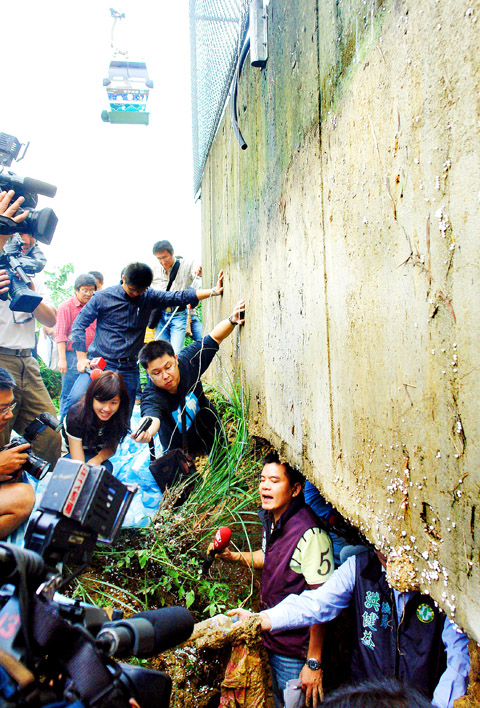Taipei Mayor Hau Lung-bin (郝龍斌) said yesterday the Maokong Gondola would be closed until civil engineers could confirm its safety after mud slides brought by Super Typhoon Jangmi eroded the ground beneath a support pillar.
The cable car was closed at 3pm yesterday and will not open for at least a month while the evaluation is conducted by a team that will be selected by the city government, Hau told a press conference.
The decision was an about-face from the city government’s announcement on Monday that the cable car would continue to operate in spite of protests from local residents and city councilors.

PHOTO: CNA
Hau yesterday said the system was safe, but that the evaluation would be conducted to ease public anxiety.
“The city government’s departments had concluded that the gondola was safe, but apparently our evaluation result did not resolve public concerns. In order to ease the worries of residents, we decided to suspend the gondola’s operations,” he said.
Hau said the city government would invite civil engineers to conduct a thorough inspection on the stability of the system. Service will not resume until the results are in.
When asked whether any city officials would resign over the incident, Hau declined to respond, but said the city government had closed the cable car because it “feels the public’s pain.”
Taipei City councilors across party lines questioned Hau’s guarantee that the gondola was safe, saying the torrential rains had left a 2.5m-deep hole a few meters from a support pillar on a cliff.
Jangmi caused mud slides in Muzha (木柵) on Monday, one of which occurred directly under the gondola’s Corner 2 station — one of two service stations where passengers do not board. Part of a cliff bearing two support pillars crumbled in the storm.
Standing inside the hole beneath the pillar during an inspection yesterday, Democratic Progressive Party Taipei City councilors Chuang Ruei-hsiung (莊瑞雄) and Chou Bo-ya (周柏雅) scooped up loose soil and trash such as plastic bags, saying it was ridiculous to call the pillar stable.
“How can this foundation be called stable and solid when rocks keep falling from the cliff? The city government is lying,” Chuang said.
Taipei City Secretariat Director Yang Hsi-an (楊錫安) said the system was “absolutely safe.”
The pillars are set into igneous rock beneath the surface, so the stability of the pillars is not affected if top soil erodes, Yang said.
In addition, more than 340 sensors placed in the gondola system’s support pillars ensure that the system will shut down automatically if any of the pillars tilt, he said.
“We have told the mayor that the system is fine and we continue to believe that the system is fine. Operations were halted to ease public concern,” he said.
Yang said suspending operations would cost the Taipei Rapid Transit Corporation (TRTC) more than NT$45 million (US$1.4 million) for a month.
TRTC, the operator of the gondola, will refund any tickets purchased in advance.

US climber Alex Honnold is to attempt to scale Taipei 101 without a rope and harness in a live Netflix special on Jan. 24, the streaming platform announced on Wednesday. Accounting for the time difference, the two-hour broadcast of Honnold’s climb, called Skyscraper Live, is to air on Jan. 23 in the US, Netflix said in a statement. Honnold, 40, was the first person ever to free solo climb the 900m El Capitan rock formation in Yosemite National Park — a feat that was recorded and later made into the 2018 documentary film Free Solo. Netflix previewed Skyscraper Live in October, after videos

Starting on Jan. 1, YouBike riders must have insurance to use the service, and a six-month trial of NT$5 coupons under certain conditions would be implemented to balance bike shortages, a joint statement from transportation departments across Taipei, New Taipei City and Taoyuan announced yesterday. The rental bike system operator said that coupons would be offered to riders to rent bikes from full stations, for riders who take out an electric-assisted bike from a full station, and for riders who return a bike to an empty station. All riders with YouBike accounts are automatically eligible for the program, and each membership account

NUMBERS IMBALANCE: More than 4 million Taiwanese have visited China this year, while only about half a million Chinese have visited here Beijing has yet to respond to Taiwan’s requests for negotiation over matters related to the recovery of cross-strait tourism, the Tourism Administration said yesterday. Taiwan’s tourism authority issued the statement after Chinese-language daily the China Times reported yesterday that the government’s policy of banning group tours to China does not stop Taiwanese from visiting the country. As of October, more than 4.2 million had traveled to China this year, exceeding last year. Beijing estimated the number of Taiwanese tourists in China could reach 4.5 million this year. By contrast, only 500,000 Chinese tourists are expected in Taiwan, the report said. The report

Temperatures are forecast to drop steadily as a continental cold air mass moves across Taiwan, with some areas also likely to see heavy rainfall, the Central Weather Administration (CWA) said. From today through early tomorrow, a cold air mass would keep temperatures low across central and northern Taiwan, and the eastern half of Taiwan proper, with isolated brief showers forecast along Keelung’s north coast, Taipei and New Taipei City’s mountainous areas and eastern Taiwan, it said. Lows of 11°C to 15°C are forecast in central and northern Taiwan, Yilan County, and the outlying Kinmen and Lienchiang (Matsu) counties, and 14°C to 17°C